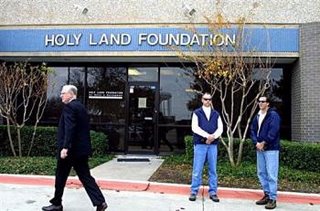US: Islamic Charity Convicted of Financing Terror on All Counts
26 Nov, 2008
 The
men, Shukri Abu-Baker, Ghassan Elashi, Mohamed El-Mezain, Mufid
Abdulqader and Abdelrahman Odeh, could face up to 20 years in
prison for their convictions on conspiracy counts, including
conspiring to provide material support to terrorists. The
verdicts, read Monday afternoon, ended a two-year saga in what is
considered the largest terror financing case since the 9/11
attacks.
The
men, Shukri Abu-Baker, Ghassan Elashi, Mohamed El-Mezain, Mufid
Abdulqader and Abdelrahman Odeh, could face up to 20 years in
prison for their convictions on conspiracy counts, including
conspiring to provide material support to terrorists. The
verdicts, read Monday afternoon, ended a two-year saga in what is
considered the largest terror financing case since the 9/11
attacks.
In the original trial last year, jurors acquitted El-Mezain on 31 of the 32 counts against him, but could not reach unanimous verdicts on any other counts, prompting a mistrial.
Prosecutors made a series of significant adjustments, from dropping 29 counts each against defendants Mufid Abdulqader and Abdelrahman Odeh, to adding new witnesses who could put the charity support in context. In addition, jurors in this trial saw three exhibits Israeli military officials seized from the Palestinian Authority which showed the PA also considered HLF to be a Hamas financer and that an HLF-supported charity committee was controlled by Hamas.
The result was a much more streamlined case that followed a
logical narrative, said Peter Margulies, a law professor at Roger
Williams University in Rhode Island. Seeing the Palestinian
Authority reach the same conclusion as the U.S. government had to
have helped, he said.
In addition, prosecutors provided summary exhibits that served as
"a road map" to the case and had to help jurors deliberate,
Margulies said. "The jury was able to look at the evidence and get
past the perceived biases of any of the witnesses and see the
evidence as a whole."
That evidence made clear that the defendants knew where the money
raised in the U.S. was going, despite legal prohibitions against
support for Hamas.
The verdict was hailed by M. Zuhdi Jasser, founder of the American Islamic Forum for Democracy. Prosecutors prevailed because they were able to "connect the ideology of political Islam and the overriding mission of Islamist organizations like the HLF to their desire to contribute to the efforts of terror groups, like Hamas," he said. "When this connection is made we will see the return of a guilty verdict. In future [terrorism financing] cases DOJ will not only have to connect the financial dots but [will have] to demonstrate an overarching common Islamist mission."
Prosecutors say HLF was part of a Palestine Committee – a conglomerate of U.S. based Muslim organizations and individuals committed to helping Hamas financially and politically. HLF was its fundraising arm, a designation formalized by Hamas deputy political director Mousa Abu Marzook in 1994. Support for Hamas became illegal with a 1995 executive order by President Bill Clinton and subsequent congressional action.
Defense attorneys say the men were simply providing desperately
needed charity to Palestinians living under Israeli occupation.
HLF routed millions of dollars through a series of Palestinian
charities known as zakat committees. While Hamas was designated as
a terrorist organization by the U.S. Treasury, those zakat
committees never were. That, defense attorneys argued, meant
donations to them did not violate the law.
"This is one of the most significant victories the Justice
Department has won in the war on terror," said Andrew McCarthy,
who prosecuted blind cleric Sheikh Omar Abdel Rahman and 11 others
for conspiring to blow up a series of New York landmarks.
"Financing is the life-blood of Jihadist organizations like Hamas.
With the assistance of willing co-conspirators, they conceal their
activities and use the Muslim obligation of charitable giving to
mask support that is actually channeled to their murderous agenda.
Today's verdicts say, loudly and clearly, that Americans aren't
fooled and won't tolerate it. As a former federal prosecutor, I am
especially proud of the assistant U.S. attorneys who persevered
through some real travails in securing justice for the American
people."
Journalist Douglas Farah studied the HLF evidence on behalf of the Nine Eleven Finding Answers (NEFA) Foundation and was the first to identify the significance of a Muslim Brotherhood memorandum outlining the group's ambitions in America. He said Monday's verdict has implications for unindicted co-conspirators in the case – most notably the Council on American-Islamic Relations (CAIR) - because it validates what already was "a clear public record of why these groups were founded and how."
The Muslim Brotherhood memo called for "a kind of grand jihad in eliminating and destroying the Western civilization from within and ‘sabotaging' its miserable house by their hands and the hands of the believers so that it is eliminated and God's religion is made victorious over all other religions."
CAIR is listed as a member of the Brotherhood's Palestine Committee and founders Omar Ahmad and Nihad Awad are included on a telephone list of committee members. CAIR has not refuted the evidence, Farah said. Government officials ought to study that evidence to realize CAIR is not what it presents itself as.
"The main currency CAIR and these groups have is their access," he said. "The time is now, with full justification and with a full public record - not a whispering campaign, not innuendo – for the government to now say without hesitation: you don't have access here. We don't want to deal with you."
After the verdicts were read, jurors were asked to determine whether convictions for money laundering meant HLF assets should be forfeited to the government, the Dallas Morning News reported. Click here to see more coverage from the Morning News.
----
Editor Steven Emerson is an internationally recognized expert on terrorism and national security and heads the Investigative Project on Terrorism. This article appeared in Family Security Matters.
| If you like this essay: |
Stumble it
|
digg it |
[Others/comment/guestlog76.htm]
